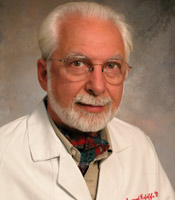NIH Award from the National Institute of Diabetes and Digestive and Kidney Diseases
Thyroid Physiology Studies of Inherited Disorders
- Principal Investigator: Samuel Refetoff, MD, Professor Emeritus of Medicine and Pediatrics; Director, Endocrinology Laboratory
- Start Date: September 15, 2009
- Total Award Amount: $52,242 (first year);
$156,000 (second year)
Public Health Relevance
Clinical studies will characterize the phenotypes caused by these genetic defects, establishing criteria for genetic testing. Early identification of mutations will provide prenatal diagnosis and the basis for genetic counseling, particularly in MCT8 defects producing incapacitating illness in male offspring. Successful development of prenatal treatment would rescue affected males from this severe handicap. The prenatal detection of unaffected fetuses carried by women with TRS mutations will provide the option of early treatment.
Project Description
The broad objective of this research proposal is to advance understanding of thyroid physiology through study of genetic defects at key regulatory processes. More specifically, research is centered on the mediation of thyroid hormone (TH) effects by studying syndromes of reduced sensitivity to TH due to defects in cell membrane transport, metabolism and action caused by mutations in the MCT8 (monocarboxylate transporter), SBP2 (selenocysteine insertion sequence binding protein) and TR (nuclear TH receptor) or cofactors genes, respectively.
These defects will be studied with a triple approach, clinical (in-vivo), tissue (in- vitro) and animal (genetically engineered mice) that complement and compensate for limitations inherent in each. 1). Clinical studies will correlate the central and peripheral tissue responses to the administration of the active TH, Ta and its precursor thyroxine (T,4) in order to determine organ and cell specific TH transport and metabolism.
2). Patient's fibroblasts, propagated in culture, will serve for the direct examination of iodothyronine specific transport across the cell membrane and their intracellular metabolism. The role of SBP2 in the hierarchy of selenoprotein synthesis will also be studied. Microarray analysis of TH action in fibroblasts will serve to identify differences in subjects with and without TRR gene mutations, in order to uncover the etiology of resistance to TH in the absence of TRB gene mutations and identify important cofactors.
3). Mice deficient in the Mct8 gene will serve to study in depth the thyroid and brain abnormalities responsible for the manifestations of MCT8 defects in man. Behavior and motor function will be tested, and central nervous system morphology will be examined by in-situ hybridization and immunohistochemistry. The discrepancy between the magnitude of thyroid and psychomotor disorders will be investigated to determine if they are causally linked. Mice with strain dependent differences in TH sensitivity will serve to identify putative modifiers of TH action.
4). Various means will be tested to revert or diminish the psychomotor defect of Mct8 deficiency. TH hormone will be given to Mct8 deficient mice at crucial stages of fetal development. TH conjugated to creatine will serve to deliver the hormone to brain through the creatine transporter, thus bypassing the TH transport defect. Selenium supplementation will be used in an attempt to increase the selenoprotein levels in SBP2 defects.
This award is funded under the American Recovery and Reinvestment Act of 2009, NIH Award number: 3R37DK015070-38S1

Samuel Refetoff, MD,
Professor Emeritus of Medicine and Pediatrics; Director, Endocrinology Laboratory
